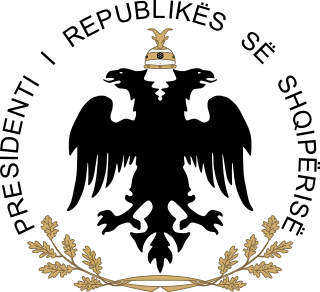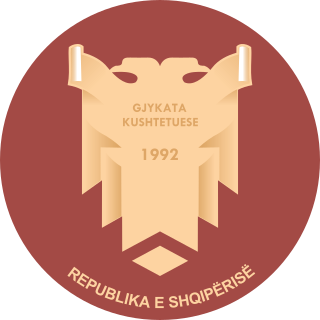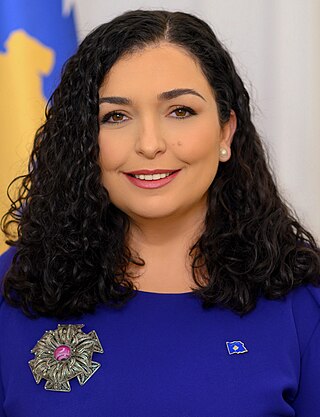Albania is a unitary parliamentary constitutional republic, in which the president of Albania is the head of state and the prime minister of Albania is the head of government in a multi-party system. The executive power is exercised by the Government and the prime minister with its Cabinet. Legislative power is vested in the Parliament of Albania. The judiciary is independent of the executive and the legislature. The political system of Albania is laid out in the 1998 constitution. The Parliament adopted the current constitution on 28 November 1998. Historically Albania has had many constitutions. Initially constituted as a monarchy in 1913, Albania became briefly a republic in 1925, and then a authoritarian monarchy in 1928. In 1939 Albania was invaded by Fascist Italian forces, imposing a puppet state, and later occupied by Nazi German forces. Following the partisan liberation from the Nazis in 1944 a provisional government was formed, which by 1946 had transformed into a communist one-party state. In March 1991 democracy was restored with multi-party elections.

The prime minister of Albania, officially the prime minister of the Republic of Albania, is the head of government of Albania. The office of the prime minister is a core institution in the politics of Albania formed after the Albanian declaration of independence on 28 November 1912. Since that time, the nation has navigated a dynamic political evolution spanning distinct periods, encompassing a monarchy, a communist regime and the eventual democratic order. In 1912, Ismail Qemali was inaugurated as the first prime minister of Albania, guiding the nation toward sovereignty amidst the complex conditions in the Balkans. In 1944, Enver Hoxha implemented a radical change in government, transforming Albania into an authoritarian and isolationist communist regime. In 1991, the nation transitioned into a democracy that marked a notable shift, when Fatos Nano emerged as the first post-communist prime minister of Albania.

The president of Albania, officially the president of the Republic of Albania, is the head of state, commander-in-chief of the military and the representative of the unity of the Albanian people.
Regular elections in Albania are mandated by the Constitution and legislation enacted by Parliament. The Parliament (Kuvendi) has 140 members elected for four-year terms. The electoral system is open list proportional representation. There are 12 multi-member constituencies corresponding to the country's 12 administrative regions. Within any constituency, parties must meet a threshold of 3 percent of votes, and pre-election coalitions must meet a threshold of 5 percent of votes.
There are five types of elections in Slovakia: municipal elections, regional elections, parliamentary elections, presidential elections and elections to the European Parliament. All four types of elections are normally held after fixed periods, although early elections can occur in certain situations. Elections are conventionally scheduled for a Saturday - the polls normally open at 7:00 in the morning and close at 22:00 in the evening. Citizens aged 18 years or older are eligible to vote. Those serving prison sentences for particularly serious crimes, as well as those deprived of legal capacity, including persons with mental disabilities, are denied the right to vote. Voter registration is passive and decentralized with the voter register maintained by municipalities based on the permanent residence register. Voter lists are updated continuously based on municipal records and input provided by state institutions or other municipalities. Voters may verify their data in voter lists, and, if necessary, request correction until the day before election day. On election day, a voter can be added to a voter list upon presenting an identity card with proof of residency. Some 4.4 million voters are registered and valid to vote in the elections. Voters are only able to vote from abroad during the Parliamentary Elections in Slovakia.

Ilir Rexhep Meta is an Albanian politician who served as President of Albania from 2017 to 2022.

The Parliament of Albania or Kuvendi is the unicameral representative body of the citizens of the Republic of Albania; it is Albania's legislature. The Parliament is composed of no less than 140 members elected to a four-year term on the basis of direct, universal, periodic and equal suffrage by secret ballot. The Parliament is presided over by the Speaker, who is assisted by at least one deputy speaker. The electoral system is based on party-list proportional representation. There are 12 multi-seat constituencies, corresponding to the country's counties.
In 1991, the Socialist Party of Albania, with specific social democratic ideology took control of the country through democratic elections. One year later the Democratic Party of Albania won the new elections. After 1990, Albania has been seeking a closer relationship with the West. What followed were deliberate programs of economic and democratic reform, but the implementation of capitalism led to the proliferation of pyramid schemes. Chaos in late 1996 to early 1997, as a result of the collapse of these pyramid schemes, alarmed the world and prompted the influx of international peacekeeping forces. In 1995, Albania was accepted into the Council of Europe and requested membership in NATO and is a potential candidate country for accession to the European Union. The workforce of Albania has continued to emigrate to Western countries, especially Greece and Italy.
Parliamentary elections were held in Albania on 24 June 2001. The result was a victory for the ruling Socialist Party of Albania, which won 73 of the 140 seats, resulting in Ilir Meta remaining Prime Minister. Voter turnout was 54%.

The Constitutional Court of the Republic of Albania is the highest authority in Albania's legal system that defends and assures the respect of the Constitution of Albania.
Indirect presidential elections were held in Albania on 30 May, 4, 8 and 11 June 2012, the seventh such elections since the collapse of the communist regime in 1991. The first through third rounds of voting were inconclusive. The fourth round resulted in the incumbent party's member Bujar Nishani being elected as President.
The 2022 Albanian presidential election marked the ninth presidential election held in Albania, taking place from 10 May to 4 June 2022. The election process commenced with the nomination of candidates by the parliament of Albania, necessitating a total of four rounds of voting. The initial three rounds of voting, held on 16, 23, and 30 May, did not result in the election of a president due to an insufficient number of candidates, largely attributed to the internal leadership crisis of the Democratic Party (PD) and the disagreements among the governing parties. On 3 June, the Socialist Party (PS) nominated Bajram Begaj, who was subsequently elected in the fourth round on 4 June.

The Twenty-ninth Legislature of Albania, officially known as the VIII Pluralist Legislature of Albania, is the legislature of Albania following the 2013 general election of Members of Parliament (MPs) to the Albanian Parliament. The party of the Prime Minister Edi Rama, PS, with its coalition partners obtained an absolute majority of 83.

The parliament of Kosovo held indirect elections for president of Kosovo on 3 and 4 April 2021. The elections successfully concluded after three rounds, with Vjosa Osmani winning 71 votes out of a total possible 120. Three political parties boycotted the vote. Nasuf Bejta, also a member of Guxo, the political party Osmani founded, was the only other candidate who received a vote during any of the other rounds.

Parliamentary elections were held in Albania on 25 April 2021 amid the COVID-19 pandemic to elect the 140 members of the parliament. A total of 1,871 candidates, including 732 women, were registered, with ten political parties, two coalitions and three independent candidates contesting the election. The Socialist Party (PS), led by incumbent Prime Minister Edi Rama, opted for an independent participation, while the opposition Democratic Party (PD), under Lulzim Basha, formed the Democratic Party – Alliance for Change, a coalition with 12 smaller parties. Other notable political entities, including the Socialist Movement for Integration (LSI) and the Social Democratic Party (PSD), also pursued electoral success independently. The election campaign was highly polarised, with competing narratives centered on pressing national issues such as European Union (EU) accession, economic development, healthcare reform, infrastructure modernisation, and the government's handling of the COVID-19 crisis. Campaign strategies were significantly altered due to the pandemic, with political parties increasingly relying on digital platforms and social media to reach voters, as traditional in-person events were limited by public health restrictions.

Bajram Begaj is an Albanian politician and military officer who has been President of Albania since 2022. Having had a long career in the Albanian army, he served as the 26th Chief of General Staff of the Albanian Armed Forces from July 2020 to June 2022. Politically independent, on 3 June 2022, Begaj was officially nominated by the governing Socialist Party as the candidate to the fourth round of the 2022 presidential election.
Parliamentary elections are scheduled to be held in Albania on 11 May 2025 to elect the 140 members of parliament.

The third Government of Prime Minister Edi Rama is the 67th ruling Government of the Republic of Albania. The Government was officially confirmed by President Ilir Meta on 18 September 2021. Following the 2021 election, the Socialist Party won, for the third consecutive time, a majority of seats in the Albanian Parliament, and, for the second consecutive time, the ability to form a government without the need for a coalition.

The Second Government of the Prime Minister Ilir Meta was the 60th Government of the Republic of Albania which was officially mandated by President Rexhep Meidani on 7 September 2001. After the 2001 election, the alliance led by the Socialist Party won the majority for the second time in a row and managed to create a post–electoral coalition of 86 seats in Parliament to form the new government.

The Thirty-first Legislature of Albania, officially known as the X Pluralist Legislature of Albania, is the legislature of Albania following the 2021 general election of Members of Parliament (MPs) to the Albanian Parliament. The party of the Prime Minister Edi Rama, PS, obtained an absolute majority of 74 deputies, becoming the first party to win three consecutive terms since the fall of communism in Albania.











